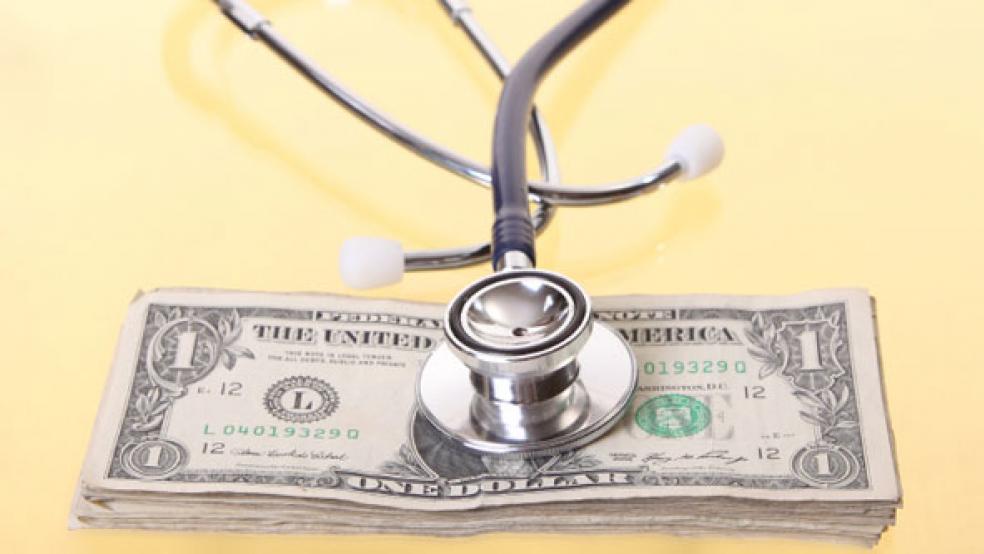“Every man has his price,” as the saying goes, but one has to wonder whether it only takes a $20 sandwich and bowl of soup for the drug industry to buy off many in the medical profession.
Doctors in recent years have come under intense scrutiny for the dubious practices of promoting pricey new brand name drugs after accepting trips, consulting fees and gifts from the pharmaceutical companies that manufacture them.
Related: Doctors Who Take Money from Drug Companies Prescribe More Expensive Drugs
As the Fiscal Times reported in March, a new study by the independent publication ProPublica revealed that physicians who receive payments from major drug and medical device manufacturers are far more inclined to prescribe brand name medications than doctors who don’t accept payments, gifts or other honoraria.
What’s more, the bigger the payments they receive, the more doctors tend to take out their prescription pads and steer their patients to the newer brand name drugs instead of the far less expensive generic drugs that essentially have the same effect. For instance, docs who received more than $5,000 from drug companies and others in 2014 for speeches, meals, consultations or other promotional activities “typically had the highest brand name prescribing percentages,” ProPublica found.
But a new study published Monday on-line on JAMA Internal Medicine that makes a similar case strains credulity. The report found that U.S. doctors who received a single meal from a pharmaceutical company were more likely to prescribe that company’s newer, more costly drugs than other doctors.
Remarkably, meals provided or paid for by the pharmaceutical companies cost less than $20 on average, or what you might pay for a meal in a neighborhood diner. And the more meals these doctors received, the greater percentage of those drugs they were inclined to prescribe relative to other drugs in the same category.
Related: Ignoring Warnings, Drug Companies Hike Prices By 10 Percent
There was a time when drug companies seeking to increase their share of the lucrative prescription drug industry were tossing around real money. Drug makers at one time lavished gifts and gratuities on doctors recruited to study and promote their new drugs, and those gifts could range from free golf trips and vacations to tickets to hot sports events
However, as The Wall Street Journal reported Tuesday, the drug companies over time began to curtail the gifts and gratuities handed out. Many restrictions were imposed on drug company payments under a code of conduct adopted in 2002 by the Pharmaceutical Research and Manufacturers of America, the drug industry’s leading advocate.
The code allows companies to provide “modest meals” to doctors, which can range from free book and beverages brought to a doctor’s office to free meals at restaurants where doctors can listen to other doctors and sales representatives discuss new drugs coming on the market, according to the Journal.
In the greater scheme of things, meals of this sort are small potatoes. And one has to wonder how such trivial perks can be so effective in motivating a doctor when it comes to prescribing the best medicine for a patient – or whether it is simply a coincidence.
Related: Get Ready for Fireworks Over Soaring Drug Prices
The report’s findings were based on analysis of federal government data that tracked and correlated payments received by doctors and the prescriptions they wrote under Medicare Part D. The study focused on 2,444 Massachusetts physicians who wrote prescriptions in 2011.
The study focused on the prescriptions that were written for three specific statin drugs: AstraZeneca PLC’s cholesterol-reducing Crestor; Allergan PC’s Bystolic that is used to treat high blood pressure, and Daiichi Sankyo Co.”s Benicar, another treatment for high blood pressure. Each of those drugs has a less costly generic alternative.
Researchers found that 899 of the physicians, or 37 percent of the total, had received payments from the drug industry. Most commonly, those payments came in the form of free meals. Among those doctors, they prescribed the brand name statin 23 percent of the time, By contrast, the other doctors who hadn’t received industry payments prescribed those brand name drugs 18 percent of the time.
“Industry payments to physicians are associated with higher rates of prescribing brand name statins,” the study concluded. “As the United States seeks to rein in the costs of prescription drugs and make them less expensive for patients, our findings are concerning.”
Related: Extreme Rise in Some Drug Prices Reaches a Tipping Point
However, as ProPublica’s senior health care reporter Charles Ornstein noted in an analysis of the latest study, “The researchers did not determine if there was a cause-and-effect relationship between payments and prescribing, a far more difficult proposition, but their study adds to a growing pile of research documenting a link between the two.”
And PhRMA complained to the Journal that the study essentially “cherry picked” physician-prescribing data “to advance a false narrative.”





